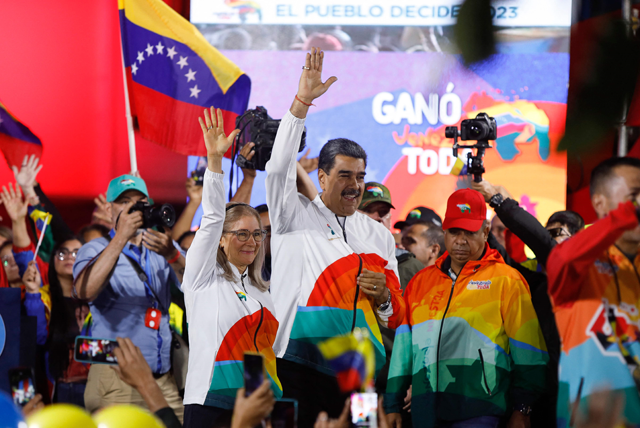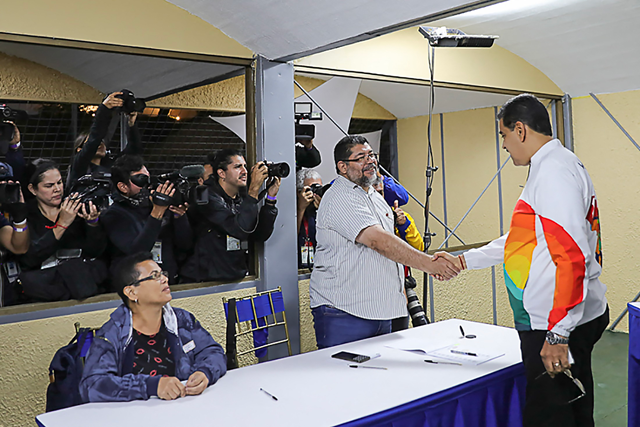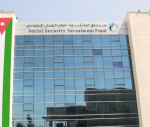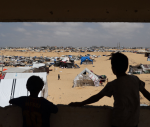You are here
Venezuela: Vote shows ‘overwhelming’ support for claim on region of Guyana
By AFP - Dec 04,2023 - Last updated at Dec 04,2023

President of the Bolivarian Republic of Venezuela, Nicolas Maduro, greets supporters before giving a speech as the National Electoral Council issued the results of the consultative referendum on Venezuelan sovereignty over the Essequibo, in Caracas on Sunday (AFP photo)
CARACAS — Venezuelan electoral authorities on Sunday claimed that 95 per cent of voters in a nonbinding referendum approved of the nation’s territorial claim on a huge chunk of neighbouring oil-rich Guyana.
It is “an evident and overwhelming victory for the ‘Yes’ in this consultative referendum”, said the president of the National Electoral Council, Elvis Amoroso.
About 10.5 million of Venezuela’s 20.7 million eligible voters took part in the consultation, which raised fears in Guyana, and around the region, about Venezuela’s ultimate intentions over the contested territory.
Electoral officials kept polling stations open an additional two hours, until 8:00 pm (00:00 GMT), to allow people already at the facilities to vote in the referendum, which the government hopes will strengthen its century-old claim to the oil-rich Essequibo territory governed by Guyana.
“Today is a day of ratification, of national sovereignty, and the people have done it with flying colours,” said Defence Minister Vladimir Padrino in an evening address on state television.
In Guyana, thousands of people, some of them wearing T-shirts reading “Essequibo belongs to Guyana”, formed human chains in solidarity with their government, and their president offered assurances that the country’s borders were secure.
The Maduro government has said it is not seeking justification to invade or annex the huge territory, as some fear in Guyana, an English-speaking former British colony.
And regardless of the outcome of the vote, little will change in the short term: The people of Essequibo are not voting, and the referendum is nonbinding.
But tensions have been rising since Guyana took bids in September for several offshore oil exploration blocks, and after a major new find was announced in October. Its petroleum reserves are similar to those of Kuwait, with the highest reserves per capita in the world.
Meanwhile, Maduro’s government which faces a severe economic crisis released a video Sunday suggesting that some Guyanese would prefer to be under Venezuelan rule.
It purportedly shows an Indigenous group of Pemon adults in Guyana lowering the nation’s flag and raising a Venezuelan flag in its stead. One begins to sing the Venezuelan national anthem.
‘Nothing to fear’
Guyana’s President Irfaan Ali said on Sunday that his government was working to protect the country’s borders and keep people safe.
“I want to assure Guyanese that there is nothing to fear,” Ali said in an address carried on Facebook.
Venezuela has claimed the huge territory of Essequibo for decades — even though its 160,000 square kilometres represent more than two-thirds of Guyana, and its population of 125,000 is one-fifth Guyana’s total.
Caracas contends that the Essequibo River to the region’s east is the natural border between the two countries, as declared in 1777 under Spanish rule, and that Britain wrongly appropriated Venezuelan lands in the 19th century.
Guyana, however, asserts the border was set in the British colonial era and was confirmed in 1899 by a court of arbitration. It says the International Court of Justice (ICJ), the UN’s top judicial body, has validated this finding.
Guyana had asked the ICJ to block the referendum. But while the court on Friday urged Caracas to take no action that might affect the disputed territory, it did not mention the measure.
The referendum covers five questions, including proposals for the creation of a Venezuelan province to be called “Guyana Essequibo”, giving the inhabitants Venezuelan citizenship, as well as a call to reject the ICJ’s jurisdiction.
The referendum “will probably produce the result desired by Maduro,” Brazilian President Luiz Inacio Lula da Silva said from Dubai, where he is attending the COP28 environment conference. But “I hope good sense will prevail”.
In Guyana, some locals played down the vote.
“The referendum is probably important for them, for Venezuela — not for us,” said Dilip Singh, a businessman who lives in the disputed region.
“I grew up in Essequibo,” he said, adding, “The Spanish have never occupied it — not at any time in our history... Now it is independent, and it will always be so.”
Related Articles
CARACAS — Venezuelans began voting on Sunday in a referendum that the government hopes will strengthen its century-old claim to the oil-rich
BRASÍLIA — The foreign ministers of Guyana and Venezuela met on Thursday in Brazil’s capital city to discuss the simmering crisis on their b
CARACAS — A British warship arrived off the coast of Guyana on Friday, further fuelling tensions over a territorial dispute with Venezuela,

















